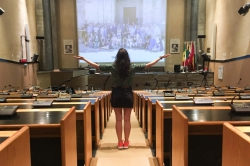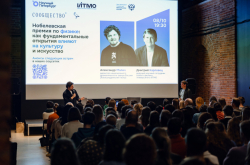Science communication experts can relay complex scientific ideas in an easily accessible yet truthful way within popular science projects. And that is what the latest intensive course developed by experts from ITMO’s Center for Science Communication was all about. The project is supported by the Vladimir Potanin Foundation.
“It’s not only the way research is “translated” from scientific jargon into our everyday terms that determines the success of a scicomm project – it’s also the chosen communication format; it can help structure the contents and the way of interacting with the audience. Within our course, all participants were welcome to develop their own projects using the information from lectures and practical classes that we structured in a product approach,” explains Konstantin Fursov, the school’s curator and academic supervisor of ITMO’s Science Communication Master’s program.

Konstantin Fursov. Photo by Shamil Troyanovsky
During the several-day course, participants went from setting goals and analyzing their target audiences to producing their projects and evaluating their results; they also practiced working in various creative formats and writing scripts for events. All projects were presented as pitches at the end of the course – here are some of them.
Comic strips about scientists
Vladislava Popova is a Bachelor’s student specializing in physics.
“When I was younger and was thinking about my career, I didn’t know any “real” scientists, but I did love Marvel characters and especially Tony Stark. I was dreaming of making my own Iron Man suit when I grew up. That’s how I ended up at MISIS University,” shared Vladislava.

Vladislava Popova. Photo by Shamil Troyanovsky
At ITMO’s intensive course, Vladislava came up with comic strips for school students, where scientists act as superheroes and students themselves are presented as citizen scientists.
The project aims to tell young people about citizen science and familiarize them with this useful new hobby. According to Vladislava’s plan, the comics are to be published on social media by schools and citizen science communities.
Science festival
The biotechnologist Elena Perushkina from Kazan came up with a new format for the science festival BioFest. Instead of exhibition halls, it would feature coworking areas organized by laboratories and industrial partners, science-themed quests, pop-sci lectures, and a startup pitch session.

Elena Perushkina. Photo by Shamil Troyanovsky
At the event, school and university students would get to work on IT products, and entrepreneurs – to chat with scientists over brunch, explains Elena.
The event’s organizing team is currently in the planning stage and is open to collaboration. Anyone can join BioFest as a speaker, participant, or a partner regardless of their university and profession – all you need to do is fill out the form (link in Russian).
Ocean-centric media
Researcher Aleksandra Volodko came to St. Petersburg from Vladivostok, where she works at the Pacific Institute of Bioorganic Chemistry. There, she studies new biologically active substances – 12% of the world’s ocean-sourced new compounds were discovered and studied at that very institution.

Aleksandra Volodko. Photo by Shamil Troyanovsky
At the same time, Ms. Volodko hosts the institute’s Telegram channel (link in Russian) and thus came to the event to develop her project further. On the channel, she uses accessible language to tell the readers about research published in Q1 journals – the most prestigious and authoritative sources in academia. The channel is read by journalists, science communicators, and researchers from other institutions and grant foundations.
These are only a few of the many pop-sci projects that emerged and grew from the school organized by ITMO’s Center for Science Communication.
“We’re careful about the atmosphere at our courses: we want to support the participants, consult them on every issue, and share examples that could inspire and inform them. Valeria Sukhanova, the school’s methodologist, succeeded in making the course comprehensive and, at the same time, balanced. She is a graduate of our Master’s program in science communication, and it’s important to us that our alumni are now partnering with the center as full-fledged specialists,” comments Marina Radchenko, the deputy head of the Center for Science Communication and the school’s manager.

Marina Radchenko. Photo by Shamil Troyanovsky
This Sunday, the center will already be hosting yet another intensive course – this time, designed for representatives of charity organizations. Those who dream of creating their own events and media products can do so within the Science Communication Master’s program – here, students learn about marketing, producing, science journalism, data visualization, and all the skills needed to become a communicator. You can also learn more about the program from the center’s official English-language website or its Telegram channel (link in Russian).






